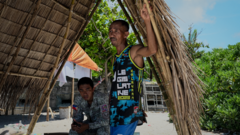Pagasa Island, a mere 37 hectares in size, stands as a testament to the enduring spirit of its 300 Filipino inhabitants who have made a home in this remote corner of the South China Sea. Known as "hope," this island faces significant challenges due to the overwhelming presence of Chinese military vessels that assert dominance in the region.
While the locals, who fish in the island’s clear waters and grow vegetables in its sandy soil, possess a deep connection to their land, they are not alone. A fleet of Chinese naval, coastguard, and militia vessels enforce claims over the surrounding waters, creating a state of constant tension. Over recent years, China has embarked on an aggressive expansion campaign, constructing military installations on previously submerged reefs and deploying an extensive flotilla of ships.
The Philippines, alongside Vietnam, remains steadfast in asserting its territorial claims within this fraught geographical landscape. Pagasa, also known by its other names like Thitu, is the Philippines' largest island in this disputed sea. The very existence of a thriving civilian community further strengthens the nation’s legal standing. Jonathan Malaya, a representative of the Philippines National Security Council, emphasized the significance of Pagasa as a strategic asset and a symbol of Filipino presence in a region heavily contested by China.
Reaching Pagasa involves a difficult journey, requiring a two to three-day boat ride or a one-hour flight that is often jeopardized by harsh weather; nonetheless, supplies such as food, water, and materials for growth and development arrive regularly from the mainland. Recent infrastructure improvements, including a new hangar and longer runway capable of accommodating larger aircraft, have bolstered the island’s connectivity, reflecting the Philippines' commitment to this territory.
While the islanders have adapted to life on Pagasa by establishing government jobs and schools, external pressures have changed their daily realities significantly. Local fisherman Larry Hugo recounts the escalating intimidation from Chinese vessels, which have pushed him to fish closer to home and limited his ability to sustain his livelihood.
On Pagasa, educators like Realyn Limbo express their devotion to the community as they nurture over 100 students in the island's modest school. Despite the challenges posed by limited resources and medical emergencies, the spirit of self-sufficiency and tranquility prevails, influenced by the deep-rooted sense of community that thrives in their isolated sanctuary.
As the Philippine government intensifies diplomatic protests to assert its claims against Chinese incursions, the residents of Pagasa continue to embody resilience and fortitude. The island stands not only as a home for its people but also as a beacon of hope in these challenging times, proudly facing threats while preserving their cultural identity in the face of oppression.
While the locals, who fish in the island’s clear waters and grow vegetables in its sandy soil, possess a deep connection to their land, they are not alone. A fleet of Chinese naval, coastguard, and militia vessels enforce claims over the surrounding waters, creating a state of constant tension. Over recent years, China has embarked on an aggressive expansion campaign, constructing military installations on previously submerged reefs and deploying an extensive flotilla of ships.
The Philippines, alongside Vietnam, remains steadfast in asserting its territorial claims within this fraught geographical landscape. Pagasa, also known by its other names like Thitu, is the Philippines' largest island in this disputed sea. The very existence of a thriving civilian community further strengthens the nation’s legal standing. Jonathan Malaya, a representative of the Philippines National Security Council, emphasized the significance of Pagasa as a strategic asset and a symbol of Filipino presence in a region heavily contested by China.
Reaching Pagasa involves a difficult journey, requiring a two to three-day boat ride or a one-hour flight that is often jeopardized by harsh weather; nonetheless, supplies such as food, water, and materials for growth and development arrive regularly from the mainland. Recent infrastructure improvements, including a new hangar and longer runway capable of accommodating larger aircraft, have bolstered the island’s connectivity, reflecting the Philippines' commitment to this territory.
While the islanders have adapted to life on Pagasa by establishing government jobs and schools, external pressures have changed their daily realities significantly. Local fisherman Larry Hugo recounts the escalating intimidation from Chinese vessels, which have pushed him to fish closer to home and limited his ability to sustain his livelihood.
On Pagasa, educators like Realyn Limbo express their devotion to the community as they nurture over 100 students in the island's modest school. Despite the challenges posed by limited resources and medical emergencies, the spirit of self-sufficiency and tranquility prevails, influenced by the deep-rooted sense of community that thrives in their isolated sanctuary.
As the Philippine government intensifies diplomatic protests to assert its claims against Chinese incursions, the residents of Pagasa continue to embody resilience and fortitude. The island stands not only as a home for its people but also as a beacon of hope in these challenging times, proudly facing threats while preserving their cultural identity in the face of oppression.

















